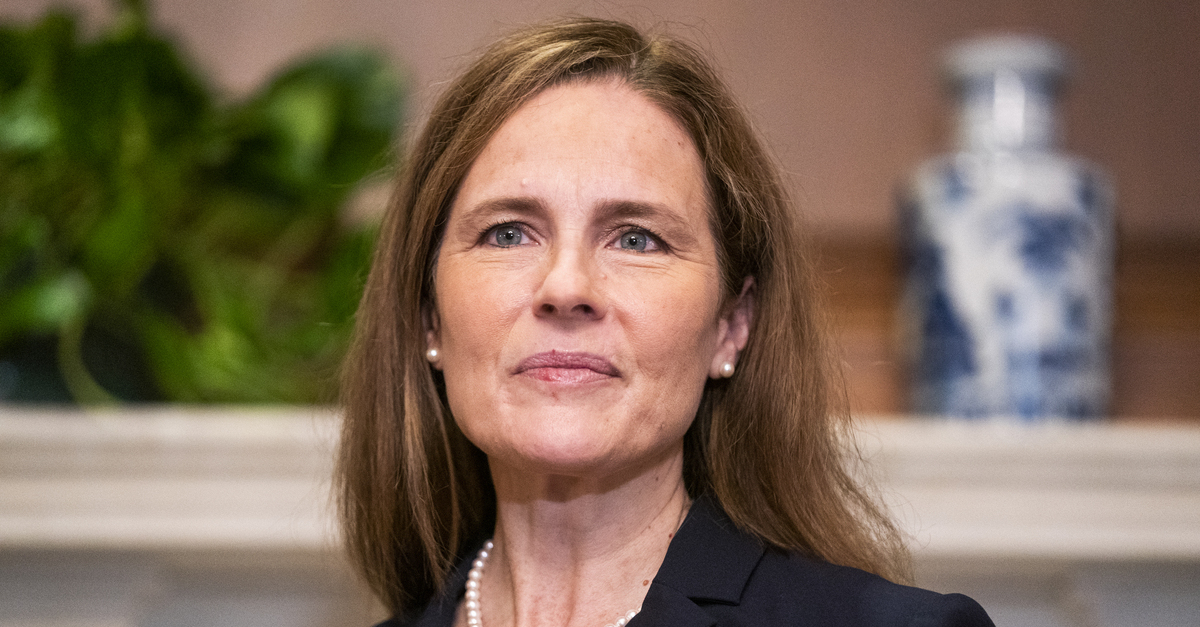
Circuit Judge Amy Coney Barrett was confirmed by the U.S. Senate early Monday evening to become the 115th justice of the U.S. Supreme Court, putting an exclamation point on a confirmation process that was equal parts whirlwind and lacking in drama.
Barrett was sworn on Monday night by Justice Clarence Thomas amidst the conservative movement and White House faithful.
The moment is decidedly a massive personal and political victory for President Donald Trump, who successfully nominated and appointed more justices in just shy of four years than his predecessor Barack Obama was able to achieve in eight.
Chief Justice John Roberts will administer the judicial oath to Barrett in a separate private ceremony on Tuesday, the Supreme Court announced.
All Democrats voted against Barrett, whose nomination the party has declared to be “illegitimate.” Independent Senators Angus King and Bernie Sanders, who caucus with the Democrats, also voted against. Sen. Susan Collins (R-Maine), facing the prospect of losing her seat this November after her carefully constructed independent image crumbled once she voted to confirm Justice Brett Kavanaugh in October 2018, was the only GOP senator to vote no.
The final tally was 52-48 in favor.
The quick succession of Barrett’s rise from being a judge on the Seventh Circuit Court of Appeals–to which she was confirmed in October 2017–to becoming the newest-minted member of the nation’s high court was little more than a fait accompli after the September 18 death of feminist judicial icon Ruth Bader Ginsburg.
Senate Majority Leader Mitch McConnell (R-Ky.) made an avowed effort to follow through on the professional cause of his life: confirming judges and justices vetted and approved by the conservative movement legal organization the Federalist Society.
“A lot of what we’ve done over the last four years will be undone sooner or later by the next election,” McConnell said on Sunday just after the Senate voted to limit debate and advance Barrett’s nomination prior to Monday’s vote. “They won’t be able to do much about this for a long time to come.”
McConnell’s barrel-through-it focus on getting Barrett seated prior to the November 3 general election was also shared by the 45th president–who has previously stoked outrage and condemnation among his critics and political opponents by expressing a desire for the court’s newest justice to decide the election in his favor.
The breakneck pace of Barrett’s confirmation process was also decidedly expedited relative to the time U.S. senators typically spend mulling over would-be justices during the modern era.
An avowed opponent of abortion, Barrett’s lifetime appointment to the increasingly politicized court is also a huge win for the broader right-wing movement in the United States. Her confirmation will likely solidify the conservative majority’s hold on the court for nearly a generation, at least under the present laws.
Time will tell whether Barrett’s confirmation will be a Pyrrhic victory for the GOP.
Some Senate Democrats–including many senators typically averse to rhetorical broadsides–responded to the basic fact of Barrett’s nomination as an affront to notions of fair play and justice, to the legacy of Ginsburg and her last wishes, and to the made-up “standard” or precedent allegedly initiated by McConnell himself when towering conservative justice Antonin Scalia died in early 2016 and Obama unsuccessfully attempted to replace him with centrist D.C. Circuit Judge Merrick Garland.
The fact of Garland’s failed nomination–which is largely viewed as “stolen” by many Democrats–and the replacement of Ginsburg with a more extreme version of her polar political opposite has left Democratic Party voters, politicians and affiliated center-left organizations in a rare and perfect storm of fuming outrage over what they see as the high court’s inordinate power over Americans’ lives.
Critics of the GOP’s power grab have pointed to statistics such as the following in an effort to further delegitimize the Supreme Court as presently-constituted: “Even though [Republicans] have only won the popular vote *once* in the last seven elections, Republican Presidents have picked 15 of the last 19 Supreme Court justices.”
Barrett’s confirmation is likely to be seen as proof of concept for a Democratic Party whose younger intellectual and political leaders have slowly but surely begun to rally around the legal and constitutional remedy of expanding the number of justices on the Supreme Court (or other proposals).
Such a move or moves would, in theory, be even easier than a rushed through Supreme Court nomination; a law increasing the size of court only needs a simple majority in both houses of Congress.
For now, the conservative movement can revel in a decades-long effort to obtain a rock-solid majority on the Supreme Court in order to complete a rollback of the Warren Court’s liberalism. But a new president and Senate majority would substantially threaten those gains.
[image via Jim Lo Scalzo-Pool/Getty Images]